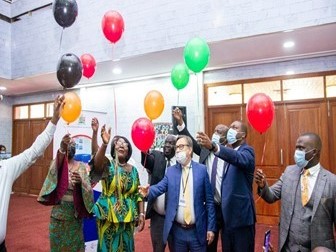The SP&PFM project in Zambia is supporting the National Health Insurance Authority (NHIMA) in estimating the cost of expanding coverage to non-contributory participants as well as assessing the impact of the overall financial sustainability of the scheme. Using the ILO-HEALTH actuarial model, the exercise considers multiple scenarios concerning the phased on-boarding of different Social Cash Transfer (SCT) beneficiary cohorts – such as persons with disabilities, the elderly, female and child-headed households – to determine the related prospective liabilities.
In the process, the project is building NHIMA’s internal capacities for performance monitoring, regular data collection and periodic actuarial analysis.
This project was launched officially and jointly by the EU delegation, the Minister of Labour, the ILO Country Director for Zambia, Malawi and Mozambique and the Director of NHIMA on the 22nd June 2022. Since the launch, activities have focused on improving the quality and completeness of the current scheme’s data to ensure the validity of actuarial model results when they will be conducted. The project has hired an actuarial expert who was also part of the team that set up NHIMA at the beginning, this is in order to ensure continuity and leverage institutional memory. Additional actuarial support is being provided by ILO’s SOCPRO team in Geneva. Training on the ILO-HEALTH model has also been carried out with NHIMA officials as part of the project’s objectives to build up the NHIMA’s in-house actuarial capacity.
NHIMA is Zambia’s sole national health insurance provider and has the mandate of promoting universal healthcare coverage through the implementation of the National Health Insurance Scheme (NHIS). Access to services under the NHIS began in February 2020 for people employed in the formal sector. The scheme has since onboarded 1,147,131 contributing members which corresponds to almost complete coverage of the formal sector population. However, poor and vulnerable citizens, as well as workers from the informal sector, who represent a large part of the labour force, are still unable to access social health insurance services. The project will contribute to the extension of social health insurance coverage in Zambia through:
- the improvement of NHIMA’s internal capacities to monitor the financial sustainability of the social health insurance scheme, as a key determinant of its capacity to sustain the scheme over time and ensure effective management of health care costs and;
- support for advancing evidence-based preliminary consensus amongst key stakeholders on the specific modalities of the extension of non-contributory coverage to the poor and vulnerable.
Read more about the SP&PFM in Zambia: here

